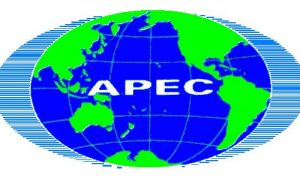MercoPress. South Atlantic News Agency
APEC leaders pledge new effort to conclude Doha talks
 “There has never been a more urgent need to make progress” in world trade negotiations
“There has never been a more urgent need to make progress” in world trade negotiations Asia Pacific Economic Cooperation, APEC, leaders meeting in Australia pledged on Sunday their political will and flexibility to bring faltering global trade talks into their final phase this year.
"There has never been a more urgent need to make progress" in world trade negotiations, according to a final statement released by the 21-member APEC trading powers which includes China, Japan and the United States and represent over half of the world commerce. World Trade Organization, WTO negotiations in the so-called Doha round resumed in Geneva last week on the basis of two new proposals with the purpose of overcoming a deadlock between rich and poor nations over how much to cut barriers in agricultural and industrial trade. The Doha round was launched in the Qatar in November 2001 but negotiations have stumbled over reducing farm subsidies in the United States, Europe and Japan, and scaling back industrial tariffs in emerging markets like China, India, Brazil and South Africa. APEC leaders said the overall success of the WTO negotiations would depend on early progress in bridging gaps in those two critical areas. "We pledge the political will, flexibility and ambition to ensure the Doha Round negotiations enter their final phase this year," the leaders' statement said. "We call on our WTO partners to join in this vital effort." A successful global trade deal would "deliver new trade flows for the benefit of all, including developing countries," it said, adding that APEC members, which collectively account for half of global trade, have a major stake in helping to create a rules-based global trading system. Host Australian Prime Minister John Howard, announcing the final conclusions of the summit, also highlighted steps announced by the leaders on Saturday to curb global warming, which included two nonbinding goals on improving energy efficiency and increasing forest cover. Unlike the UN-backed Kyoto Protocol, the "Sydney Declaration" on climate change does not set targets on the greenhouse gas emissions that cause global warming. US President George W. Bush, Chinese President Hu Jintao, Russian President Vladimir Putin and other APEC leaders hope the climate change program will influence coming global warming talks that critics have dismissed as too timid. Supporters said the significance lay in getting the United States and China -- the world's biggest polluters -- to agree on common goals and in getting rich and developing nations to work together. The APEC program may sway coming talks in Washington, New York and Indonesia on a new climate change blueprint to replace Kyoto, which expires in 2012. Under the platform, APEC members will reduce "energy intensity" -- the amount of energy needed to produce a dollar of gross domestic product – 25% by 2030. They pledged to increase forest cover in the region by at least 20 million hectares by 2020.




Top Comments
Disclaimer & comment rulesCommenting for this story is now closed.
If you have a Facebook account, become a fan and comment on our Facebook Page!